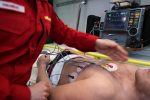
Frequently you see emergency personnel, and it may appear as though all they do is grab a sick or injured individual and rush them to the hospital.
However, their tasks are much deeper and more technical, requiring knowledge, skill, physical and mental strength, and care.
EMTs are the most popular types of EMS providers with various certifications accessible.
Many EMTs earn an Advanced EMT certificate or become a Paramedic after completing their fundamental training.
Other health care professionals also use their EMT skills and expertise as building blocks to their professions.
Page Navigation
Pros of Being an EMT
In this exciting career field, there is a wealth of pros, including:
Critical Thinking
Emergency responders often save people’s lives by responding quickly and being competent in their care.
You have to fill many roles and think on your feet as an ambulance crew member, knowing that every situation you encounter differs.
Medical attention is needed immediately following incidents such as car wrecks, cardiovascular problems, strokes, tumbles, giving birth, and gunshots.
Healthcare experts who are well-trained in the care and transportation of patients are the ones who perform this critical function.
First to Respond to an Emergency
The EMTs get dispatched by properly trained dispatchers who maintain radio communication or patch individuals through to healthcare experts for on-the-spot guidance, as necessary.
They conduct examinations on the victims to determine the extent of their injuries or illnesses.
They provide first aid and emergency life support, such as oxygen and cardiopulmonary resuscitation, by established procedures.
Before transporting the patient to a healthcare center, they sometimes use specialized tools, like backboards, for immobilization.
You get to Help Save Lives by Administering Care
In terms of the emergency medical technician system, the first element is the EMT-Basic (or EMT-I).
An EMT with this degree of expertise is responsible for providing emergency healthcare to patients at the incident site.
You also transport them to the treatment center under the supervision of a physician.
Evaluate and treat breathing, cardiovascular, and injury emergencies with an EMT-emergency Basic’s skills.
Before patients get admitted to the emergency room, they assist the medical staff in completing pre-admit treatment and compiling patient medical histories.
Become a Member of a Team
Teamwork is the norm for EMTs. It is common practice for one EMT to drive while the other EMT checks on the patient and provides additional assistance as needed.
There are always medical supplies on hand in the emergency vehicles maintained to the highest standards.
You may get assigned to the same coworker for an extended period or even your entire career.
Patients who are seriously sick or hurt and need to go to a healthcare trauma center are transported by helicopters with EMTs on board as crew members.
Scope for Growth
You’ll be able to take advantage of additional training such as EMT-Advanced (or EMT-II).
Injectable catheters and blood sugar treatments or a restricted amount of drugs can get inserted, and the Advanced EMT can take blood for laboratory examination.
EMT-IIs may even be permitted to conduct critical care techniques in certain situations. Improving your abilities will lead to a higher salary and better job performance.
Ability to Keep an Eye on Things
Keeping track of a patient’s health status, treatment, and reactions to medications, as well as any side effects, is an integral part of your job.
EMT-Paramedics provide this type of pre-hospital care.
Paramedics may administer drugs orally and intravenously, insert breathing-aid devices, use stomach suction equipment and interpret electrocardiograms.
You will also use monitors and other complex equipment and procedures of the different levels.
Work Stability
Paramedics and EMTs can expect to see a job growth rate of 24 percent, which is significantly higher than the national average.
It’s a good thing because it means that you’ll have a steady job and the opportunity to land a new one in the future. You don’t have to be stuck either.
You can become a paramedic or another type of health care professional after earning your EMT certificate, in addition to becoming a more advanced EMT.
It is common for physician assistants to spend some time in the field (e.g., working as an EMT) to prepare themselves for PA programs better.
Fast Training
Consider becoming an EMT if you’re already working and want to pursue a career in the medical field but don’t want to spend a lot of time in school.
EMT training gets completed in as little as a year, as opposed to the two years required for paramedics (about 150 hours of courses). Advanced EMT coursework may require up to 400 hours of instruction, but it still is far less than the training needed by physicians.
Cons of Being an EMT
Yes, you’ve heard all the great things about becoming an EMT, but you also need to learn about the downside, such as:
Some Patients Can Get Disrespectful
Both patients and their loved ones can feel the strain of an emergency. As a result, the EMTs trying to help them can become the target of their wrath.
As a result, things can get a lot more complicated than they need to be. Workers who are doing their best in the face of a difficult situation sometimes get criticized for it. Emergency medical technicians (EMTs) must stay alert for any eventuality.
A Lot of Administrative Tasks (paperwork)
An EMT’s job requires a great deal of paperwork, accountability, and proper record keeping.
It is because most of them are government-run entities.
These details require a lot of time to put together, which can be exhausting for an EMT.
However, if you don’t like it, you’ll either have to get used to it or look for a new job.
Decrease in Quality of Sleep
EMTs are at risk of being drained or burned out, a severe problem.
To be a dispatcher, you must be prepared to work 12- or 24-hour shifts and spend a lot of time on the road.
You may find yourself incapable of getting a decent night’s rest for an extended period because your days may become blurred.
Some people avoid this career path because of the high-stress levels and the long hours required, but if you’re up for the challenge, you’ll be successful.
Non-urgent Calls
Functioning as an EMT is not all sunshine and rainbows. In too many cases, they respond to non-emergencies.
The time lost could have been used to make an important phone call or take a much-needed break from a hectic day.
It’s not uncommon for people to call for help with minor issues, like stubbed toes and toothaches.
You Might Get Injured
You may frequently find yourself in risky conditions while performing your duties as a police officer.
As a result, mental health calls can expose you to dangerous and potentially armed individuals.
You may have to deal with high-stress situations such as responding to gun violence and other serious crimes.
EMT training guides and websites will give you some insight into the actual life of an EMT, but there will always be surprises.
Intense Physical Activity
EMTs are required to perform a high level of physical work.
Lifting people down and up multiple stairs is a necessary part of the job.
Fast and meticulous movement is essential. Staying in the same stance for long durations is expected.
Being an EMT requires a lot of physical exertion, and the older you become, the more difficult it will be on one’s body.
Too Little Time to Spend With Loved Ones and Friends
To avoid exhaustion and exhaustion, EMTs may not return home simultaneously each day.
They can’t plan family events, dates, or just quality time together because their schedules are unpredictable.
Their personal lives may suffer as a result, and they may even lose their jobs due to the emotional toll.
When deciding on a career in this field, having a supportive and understanding family is essential.
Mentally Taxing
Being an EMT can put a strain on your mental and emotional well-being as well.
It is necessary to be ready to see many gruesome crashes.
You may see people who have been shot, assaulted, or have experienced head trauma, or you might even have to hold the hand of someone who is about to die.
A few of the patients may pose a threat to both themselves and you.
To be an EMT, you must be able to handle yourself in a wide range of terrifying circumstances.
Should You Become an EMT?
If you enjoy learning new tasks, helping others, and thinking on your feet, the answer is yes.
It is a good choice that serves as a stepping stone to other medical professions that offer stability, great pay, improved skills, and knowledge.
The Pros outweigh the cons making this a great entry point into the healthcare world and a decent salary, to begin with, which to begin.
The bottom line is, your job is stable, exciting and you always have a supportive team on which to rely.
Pros and Cons of Being an EMT Summary Table
| Pros of Being an EMT | Cons of Being an EMT |
|---|---|
| Critical Thinking | Some Patients Can Get Disrespectful |
| First to Respond to an Emergency | A Lot of Administrative Tasks (paperwork) |
| You get to Help Save Lives by Administering Care | Decrease in Quality of Sleep |
| Become a Member of a Team | Non-urgent Calls |
| Scope for Growth | You Might Get Injured |
| Ability to Keep an Eye on Things | Intense Physical Activity |
| Work Stability | Too Little Time to Spend With Loved Ones and Friends |
| Fast Training | Mentally Taxing |









